人教版(2019)必修第二册Unit4 History and Traditions Listening and Speaking课件(共24张PPT,内镶嵌音频)
文档属性
| 名称 | 人教版(2019)必修第二册Unit4 History and Traditions Listening and Speaking课件(共24张PPT,内镶嵌音频) | 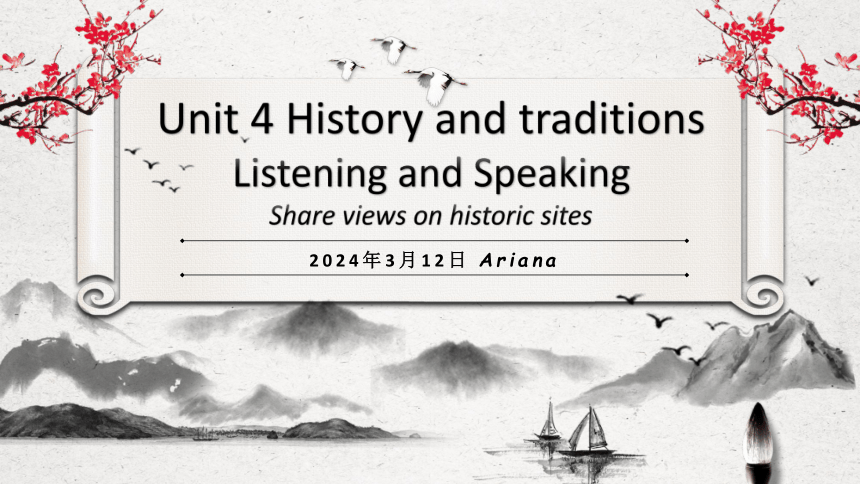 | |
| 格式 | pptx | ||
| 文件大小 | 22.9MB | ||
| 资源类型 | 教案 | ||
| 版本资源 | 人教版(2019) | ||
| 科目 | 英语 | ||
| 更新时间 | 2024-03-13 13:59:26 | ||
图片预览

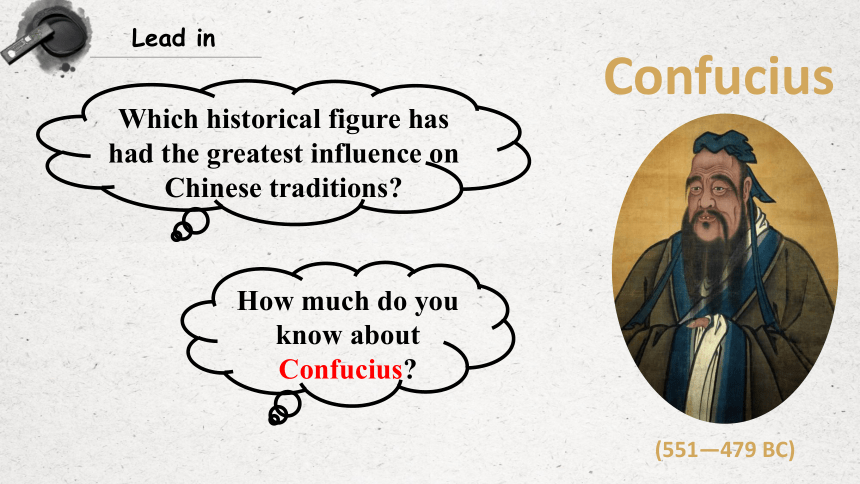
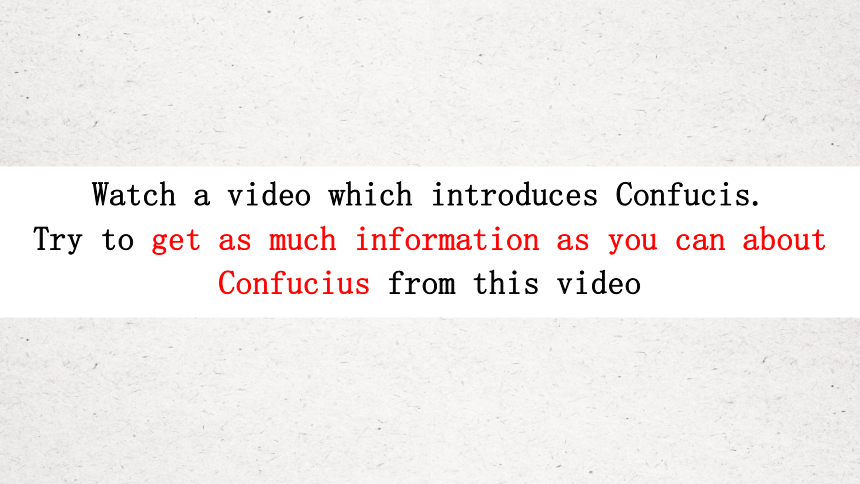
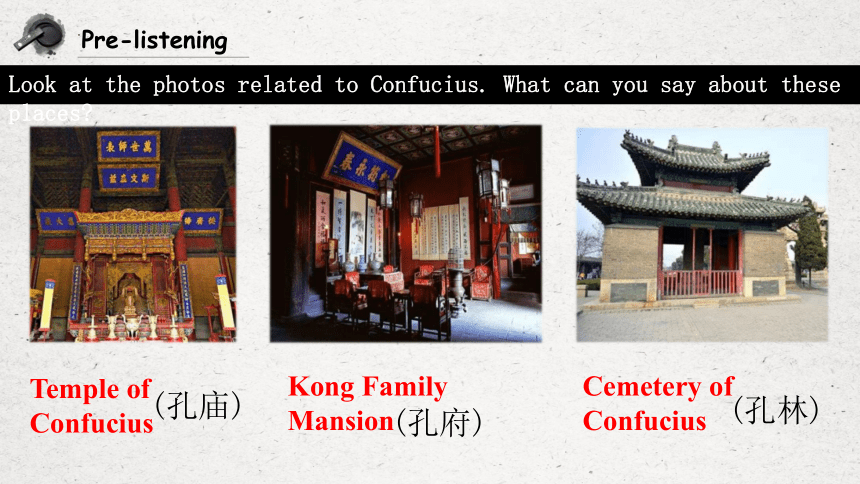
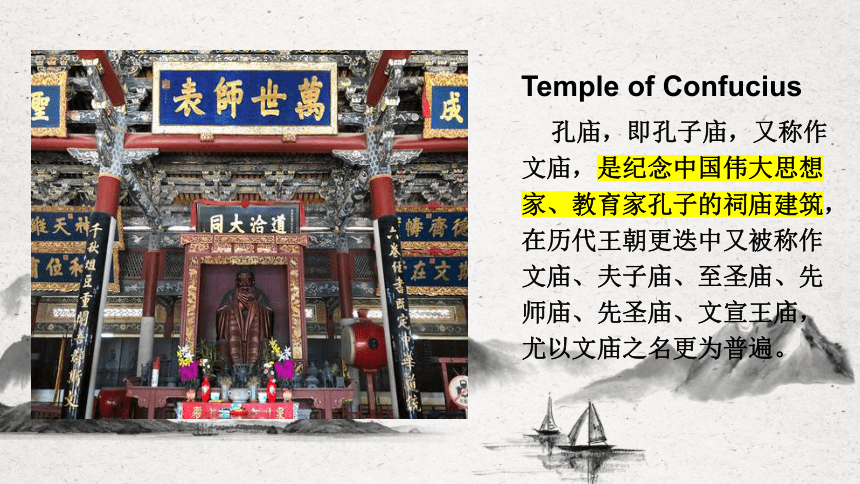


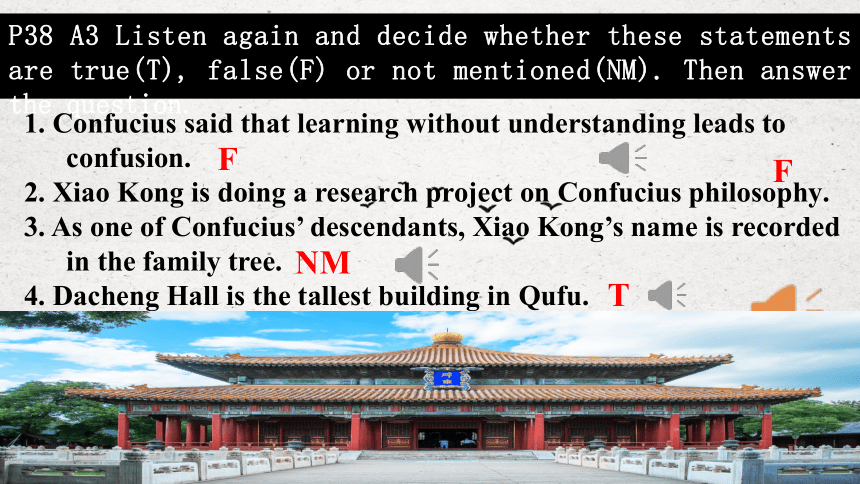

文档简介
(共24张PPT)
2024年3月12日 Ariana
Unit 4 History and traditions
Listening and Speaking
Share views on historic sites
Lead in
How much do you know about Confucius
Which historical figure has had the greatest influence on Chinese traditions
Confucius
(551—479 BC)
Watch a video which introduces Confucis.
Try to get as much information as you can about Confucius from this video
Temple of Confucius
Kong Family Mansion
Cemetery of Confucius
(孔庙)
(孔府)
(孔林)
Pre-listening
Look at the photos related to Confucius. What can you say about these places
Temple of Confucius
孔庙,即孔子庙,又称作文庙,是纪念中国伟大思想家、教育家孔子的祠庙建筑,在历代王朝更迭中又被称作文庙、夫子庙、至圣庙、先师庙、先圣庙、文宣王庙,尤以文庙之名更为普遍。
Listen to a conversation between a British tourist and a Chinese student in Qufu, and then write down what they say about Confucius.
While-listening
Fact/ Opinion about Confucius
William Confucius is one of his ____________________;
He is a ___________;
He lived __________ years ago.
Xiao Kong Confucius has over ____________descendants;
He was a great ________ and had many ______ about __________
He was one of the greatest _______ in history.
favourite philosophers
wise man
over 2500
3 million
educator
education
ideas
minds
P38 Activity 2 listen and fill in the blanks.
1. Confucius said that learning without understanding leads to confusion.
2. Xiao Kong is doing a research project on Confucius philosophy.
3. As one of Confucius’ descendants, Xiao Kong’s name is recorded in the family tree.
4. Dacheng Hall is the tallest building in Qufu.
F
F
NM
T
P38 A3 Listen again and decide whether these statements are true(T), false(F) or not mentioned(NM). Then answer the question.
It's so well-respected in Qufu that no other building in the city can be taller than it
Wiliam: Excuse me, do you speak English I'm looking for the Confucius Temple, but I’m not good at maps-they’re my Achilles’ heel!
Xiao Kong: Oh, hello, e with me-I’m going to the temple right now. By the way, what does “Achilles’ heel” mean
William: Oh, it means that something is my weakness-I'm really bad with maps! So do you know much about Confucius He's one of my favourite philosophers. He was such a wise man.
Xiao Kong: Oh, yes. I was born here. In fact, I believe I am a descendant of Confucius himself.
William: No way, you're pulling my leg, right So how do you know you're related to Confucius Didn't he live over 2,500 years ago
Xiao Kong: Yes, but his family tree is well recorded. He has over three million descendants. Sorry again, what does “pulling my leg” mean
William: Oh, sorry, it means to joke with someone. Anyway, so you're actually going to the temple to pay respects to your relative
Xiao Kong: Well, yes. But I’m also meeting my study group there. We are doing a research project on Confucius’ ideas on education. You know, Confucius was a great educator, and he had many great ideas about education. For example, he talked about the relationship between learning and reflecting. He believed that learning without reflecting leads to confusion… Oh, look, the temple is just over there.
William: Oh, great! What's that big building over there
Xiao Kong: Oh, that’s the famous Dacheng Hall. You know, it's so well-respected in Qufu that no other building in the city can be taller than it.
William: Wow, now that’s respect. That’s a little bit like my hometown-Stratford-upon-Avon.
Xiao Kong: Wait, you mean where Shakespeare was from What a coincidence-Confucius and Shakespeare, two of the greatest minds in history! I really want to visit the UK-I’m really interested in British history and culture.
William: Oh, that’s great! So later we can go for a cup of tea and have a chat about it. And it would be great if you could take me somewhere to get my watch fixed.
Xiao Kong: OK, no problem! So come and meet my study group-we can tell you all about the temple. And how long are you staying in Qufu I can show you the Cemetery of Confucius and the Kong Family Mansion as well…
William: Really That’s so kind! I need all the help I can get-I'm like a fish out of water!
4. Write down the English idioms that are used in the conversation. Explain their meanings and think about some Chinese equivalents.
An idiom is an expression which means something different from the meaning of the individual words. Some idioms present an idea or paint a picture that gives a hint as to the meaning. Other idioms can only be understood from the context in which they appear.
English idiom Meaning Chinese equivalent
Achilles' heel
pull one's leg
fish out of water
如芒在背/不得其所
something that is someone’s weakness
to joke with someone
Something who feels uncomfortable because they are in an unfamiliar place
弱点;要害
戏弄
Discuss in paris and guess the Chinese equivalent of the following English idioms.
English idiom Chinese equivalent
Love me, love my dog.
Kill two birds with a stone.
a piece of cake
When pigs fly
break a leg
The sword of Damocles
祝你好运
爱屋及乌
一石二鸟
小菜一碟
绝不可能
达摩克利斯之剑,随时可能降临的灾祸
1. Break the ice.
2. Cry over spilt milk.
3. No man is an island.
To be the first one to do sth
To be unhappy about what cannot be undone
People need each other in order to survive.
What do the following idioms mean
4. Cost an arm and a leg.
5. It is raining cats and dogs.
6. There’s no such thing as a free lunch.
To cost lots of money
It is raining very heavily.
To be aware of sth that seems free of cost but may have a charge levied in another form
Learning without reflecting leads to confusion.
Review the old and learn the new.
Make no social distinctions in teaching.
To learn and at due time to repeat what one has learnt, isn't that after all a pleasure
Do not do to others what you do not want others to do to you.
Confucius' ideas on education
Post-listening
学而时习之,不亦说乎?
有教无类
学而不思则罔
温故而知新
己所不欲勿施于人
Group Discussion
What do you know about Confucius’ ideas on education Think of two or three examples.
Is it significant for us to learn about Conficius, the hisrtory, and traditoins of our country
A people without the konwledge of their past history, origin and culture is like a tree without roots.
--- Marcus Garvey
一个不了解自己历史,起源和文化的民族,就如同一棵无根之树。
——马库斯·贾维
一般来说,相邻的两个单词属于同一意群时,前一词末尾的某些音素和后一词词首的某些音素,可能连起来读。
1. 辅音+元音:前一词以辅音结尾,后一词以元音开头时。
e.g. Look at the photos.
2. r/re +元音:前一词以-r或-re结尾,后一词以元音开头,此时
r或re发/r/音,与后面元音连读。
e.g. There are many kinds.
3. 元音+元音:前一个词以/i/或/i:/结尾,后一词以元音开头时,添加/j/后连读;前一词以/u或/u:/结尾,后一词以元音开头时,添加/w/后连读。
e.g. I agree.
Go out of the room.
Read this part of the poem “If—” written by British poet Rudyard Kipling. Notice the linking sounds. Then mark the linking sounds after the model.
If you can make one heap of all your winnings
And risk it on one turn of pitch-and-toss,
And lose, and start again at your beginnings
And never breathe a word about your loss;
If you can force your heart and nerve and sinew
To serve your turn long after they are gone,
And so hold on when there is nothing in you
Except the Will which says to them: “Hold on!”
If you can make one heap of all your winnings
And risk it on one turn of pitch-and-toss,
And lose, and start again at your beginnings
And never breathe a word about your loss;
If you can force your heart and nerve and sinew
To serve your turn long after they are gone,
And so hold on when there is nothing in you
Except the Will which says to them: “Hold on!”
Repeat the poem after the recording.
Thanks for listening!
2024年3月12日 Ariana
Unit 4 History and traditions
Listening and Speaking
Share views on historic sites
Lead in
How much do you know about Confucius
Which historical figure has had the greatest influence on Chinese traditions
Confucius
(551—479 BC)
Watch a video which introduces Confucis.
Try to get as much information as you can about Confucius from this video
Temple of Confucius
Kong Family Mansion
Cemetery of Confucius
(孔庙)
(孔府)
(孔林)
Pre-listening
Look at the photos related to Confucius. What can you say about these places
Temple of Confucius
孔庙,即孔子庙,又称作文庙,是纪念中国伟大思想家、教育家孔子的祠庙建筑,在历代王朝更迭中又被称作文庙、夫子庙、至圣庙、先师庙、先圣庙、文宣王庙,尤以文庙之名更为普遍。
Listen to a conversation between a British tourist and a Chinese student in Qufu, and then write down what they say about Confucius.
While-listening
Fact/ Opinion about Confucius
William Confucius is one of his ____________________;
He is a ___________;
He lived __________ years ago.
Xiao Kong Confucius has over ____________descendants;
He was a great ________ and had many ______ about __________
He was one of the greatest _______ in history.
favourite philosophers
wise man
over 2500
3 million
educator
education
ideas
minds
P38 Activity 2 listen and fill in the blanks.
1. Confucius said that learning without understanding leads to confusion.
2. Xiao Kong is doing a research project on Confucius philosophy.
3. As one of Confucius’ descendants, Xiao Kong’s name is recorded in the family tree.
4. Dacheng Hall is the tallest building in Qufu.
F
F
NM
T
P38 A3 Listen again and decide whether these statements are true(T), false(F) or not mentioned(NM). Then answer the question.
It's so well-respected in Qufu that no other building in the city can be taller than it
Wiliam: Excuse me, do you speak English I'm looking for the Confucius Temple, but I’m not good at maps-they’re my Achilles’ heel!
Xiao Kong: Oh, hello, e with me-I’m going to the temple right now. By the way, what does “Achilles’ heel” mean
William: Oh, it means that something is my weakness-I'm really bad with maps! So do you know much about Confucius He's one of my favourite philosophers. He was such a wise man.
Xiao Kong: Oh, yes. I was born here. In fact, I believe I am a descendant of Confucius himself.
William: No way, you're pulling my leg, right So how do you know you're related to Confucius Didn't he live over 2,500 years ago
Xiao Kong: Yes, but his family tree is well recorded. He has over three million descendants. Sorry again, what does “pulling my leg” mean
William: Oh, sorry, it means to joke with someone. Anyway, so you're actually going to the temple to pay respects to your relative
Xiao Kong: Well, yes. But I’m also meeting my study group there. We are doing a research project on Confucius’ ideas on education. You know, Confucius was a great educator, and he had many great ideas about education. For example, he talked about the relationship between learning and reflecting. He believed that learning without reflecting leads to confusion… Oh, look, the temple is just over there.
William: Oh, great! What's that big building over there
Xiao Kong: Oh, that’s the famous Dacheng Hall. You know, it's so well-respected in Qufu that no other building in the city can be taller than it.
William: Wow, now that’s respect. That’s a little bit like my hometown-Stratford-upon-Avon.
Xiao Kong: Wait, you mean where Shakespeare was from What a coincidence-Confucius and Shakespeare, two of the greatest minds in history! I really want to visit the UK-I’m really interested in British history and culture.
William: Oh, that’s great! So later we can go for a cup of tea and have a chat about it. And it would be great if you could take me somewhere to get my watch fixed.
Xiao Kong: OK, no problem! So come and meet my study group-we can tell you all about the temple. And how long are you staying in Qufu I can show you the Cemetery of Confucius and the Kong Family Mansion as well…
William: Really That’s so kind! I need all the help I can get-I'm like a fish out of water!
4. Write down the English idioms that are used in the conversation. Explain their meanings and think about some Chinese equivalents.
An idiom is an expression which means something different from the meaning of the individual words. Some idioms present an idea or paint a picture that gives a hint as to the meaning. Other idioms can only be understood from the context in which they appear.
English idiom Meaning Chinese equivalent
Achilles' heel
pull one's leg
fish out of water
如芒在背/不得其所
something that is someone’s weakness
to joke with someone
Something who feels uncomfortable because they are in an unfamiliar place
弱点;要害
戏弄
Discuss in paris and guess the Chinese equivalent of the following English idioms.
English idiom Chinese equivalent
Love me, love my dog.
Kill two birds with a stone.
a piece of cake
When pigs fly
break a leg
The sword of Damocles
祝你好运
爱屋及乌
一石二鸟
小菜一碟
绝不可能
达摩克利斯之剑,随时可能降临的灾祸
1. Break the ice.
2. Cry over spilt milk.
3. No man is an island.
To be the first one to do sth
To be unhappy about what cannot be undone
People need each other in order to survive.
What do the following idioms mean
4. Cost an arm and a leg.
5. It is raining cats and dogs.
6. There’s no such thing as a free lunch.
To cost lots of money
It is raining very heavily.
To be aware of sth that seems free of cost but may have a charge levied in another form
Learning without reflecting leads to confusion.
Review the old and learn the new.
Make no social distinctions in teaching.
To learn and at due time to repeat what one has learnt, isn't that after all a pleasure
Do not do to others what you do not want others to do to you.
Confucius' ideas on education
Post-listening
学而时习之,不亦说乎?
有教无类
学而不思则罔
温故而知新
己所不欲勿施于人
Group Discussion
What do you know about Confucius’ ideas on education Think of two or three examples.
Is it significant for us to learn about Conficius, the hisrtory, and traditoins of our country
A people without the konwledge of their past history, origin and culture is like a tree without roots.
--- Marcus Garvey
一个不了解自己历史,起源和文化的民族,就如同一棵无根之树。
——马库斯·贾维
一般来说,相邻的两个单词属于同一意群时,前一词末尾的某些音素和后一词词首的某些音素,可能连起来读。
1. 辅音+元音:前一词以辅音结尾,后一词以元音开头时。
e.g. Look at the photos.
2. r/re +元音:前一词以-r或-re结尾,后一词以元音开头,此时
r或re发/r/音,与后面元音连读。
e.g. There are many kinds.
3. 元音+元音:前一个词以/i/或/i:/结尾,后一词以元音开头时,添加/j/后连读;前一词以/u或/u:/结尾,后一词以元音开头时,添加/w/后连读。
e.g. I agree.
Go out of the room.
Read this part of the poem “If—” written by British poet Rudyard Kipling. Notice the linking sounds. Then mark the linking sounds after the model.
If you can make one heap of all your winnings
And risk it on one turn of pitch-and-toss,
And lose, and start again at your beginnings
And never breathe a word about your loss;
If you can force your heart and nerve and sinew
To serve your turn long after they are gone,
And so hold on when there is nothing in you
Except the Will which says to them: “Hold on!”
If you can make one heap of all your winnings
And risk it on one turn of pitch-and-toss,
And lose, and start again at your beginnings
And never breathe a word about your loss;
If you can force your heart and nerve and sinew
To serve your turn long after they are gone,
And so hold on when there is nothing in you
Except the Will which says to them: “Hold on!”
Repeat the poem after the recording.
Thanks for listening!
